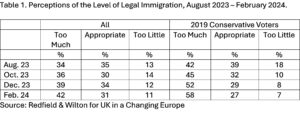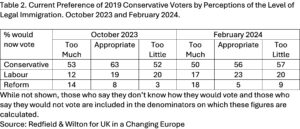For a government that had argued that Brexit would deliver lower levels of immigration, there were two unwelcome bits of news in November. First, it emerged that net migration had reached a new record high annual total of 745,000. Second, the Supreme Court ruled that Rwanda is not a ‘safe country’ and thus an inappropriate place to send asylum seekers as the government proposes.
The government responded with counter measures. It announced a tightening of the rules for those applying to come to the UK. At the same time, it brought forward legislation that declares Rwanda to be a safe country and which seeks to limit the ability of asylum seekers to appeal against any decision that they be sent there. That bill has already been passed by the Commons and is now before the Lords.
Immigration concerns Conservative supporters more than it does their Labour counterparts. In the latest poll conducted by Redfield & Wilton for UK in a Changing Europe, as many as 61% of 2019 Conservative voters say the issue will be extremely important to them in deciding how to vote in the forthcoming general election. Only half as many Labour supporters (30%) feel the same way. Doubtless the government hoped that adopting a tough line on the subject might help revive its flagging electoral fortunes.
Yet there has been little sign of that happening in the polls. True, at 26%, average support for the Conservatives during January was up a point on October. But so was support for Labour. Meanwhile, the tally for the heavily Eurosceptic and anti-immigration Reform party was up two points to a record high 9%. Indeed, on average the polls were now suggesting for every 2019 supporter the Conservatives had lost to Labour there was now one that had switched to Reform.
So why has the government’s focus on immigration brought it so little apparent reward? One question that Redfield has asked regularly in its polls for UK in a Changing Europe is whether there is too much legal immigration, too little, or whether it is at an appropriate level. Table 1 shows both how voters in general and those who voted Conservative in 2019 in particular have responded to this question in recent polls.
There has been a marked increase since the autumn in the proportion who think there is now too much immigration. Indeed, more people now express that view than have done so at any point since Redfield & Wilton first asked the question two years ago. Meanwhile, the increase has been twice as big (16 points) among those who voted Conservative in 2019 than among voters in general.
So perhaps the Conservatives’ problem is that in emphasising the issue they have inadvertently helped create the impression that immigration is too high? Meanwhile, it looks as though the recent debate has resulted in increased awareness of Reform’s anti-immigration stance. A record 39% now say that Reform want to reduce immigration from the EU, almost as many as say the same of the Conservatives (41%). Indeed, among 2019 Conservative voters no less than 50% think Reform back lower EU immigration. That is an increase of 15 points on last August – and slightly above the 46% of 2019 Tories who now think their own party wants to reduce EU immigration.
But does this mean that the focus on immigration has been pushing voters into the Reform camp? To address this question, Table 2 shows for both last October and the latest poll how many 2019 Conservative voters say they would now vote Conservative, Labour or Reform broken down by their perceptions of the level of immigration.
Reform is a more popular among those 2019 Tories who think that there is too much immigration. In contrast, Labour scores somewhat better among those who think the level of immigration is appropriate. But in combination these two patterns mean that, overall, the level of loyalty to the Conservatives only differs a little between those who think that immigration is too high and those who take a different view – a point we have made before. The issue appears to influence how 2019 Tories defect rather than whether they defect.
Moreover, it is far from evident that immigration necessarily accounts significantly for the recent rise in support for Reform. True, support for the party is up four points among those who think immigration is too high, a group that, as we have seen, is now rather more numerous. However, support is also up by a similar amount among those who do not think that immigration is too high. Most recently, at least, Reform has been picking up support irrespective of people’s views on the subject. It seems that the sources of Tory discontent stretch well beyond the confines of immigration.
This blog is also posted on the UK in a Changing Europe website.
By John Curtice
John Curtice is Senior Research Fellow at NatCen and at 'UK in a Changing Europe', Professor of Politics at Strathclyde University, and Chief Commentator on the What UK Thinks: EU website.




Meanwhile you previous editorial arguing that recent polling data showed a weakening in support for rejoining the EU, is now seen to be premature at best.
You say almost nothing on the fact that the polls show a consistent rise in viewing Brexit as a mistake. Now with a gap of greater than 20%. And miss the obvious statement that Reform voters are predominantly English nationals who are over 65.
It isn’t about immigration per se. This is just the latest wedge issue used by the usual suspects to rile up this aging demographic. Just as the created fear of islamists. They said they’d do this as it’s the only card they have to play. Division, hatred and blaming others.Report